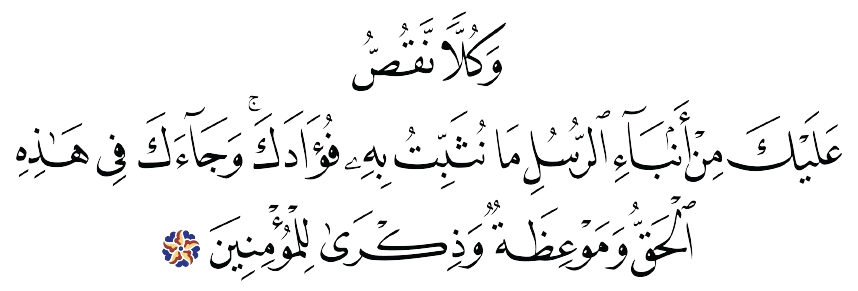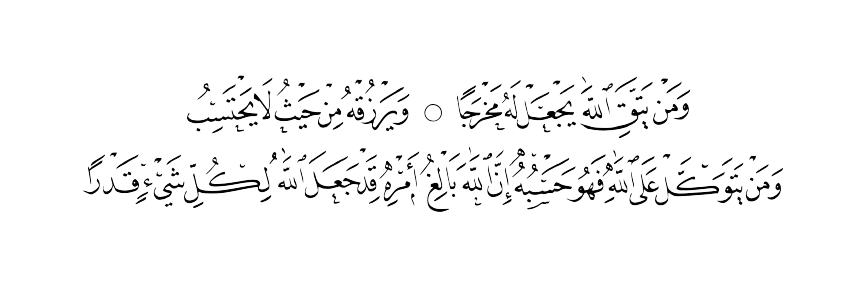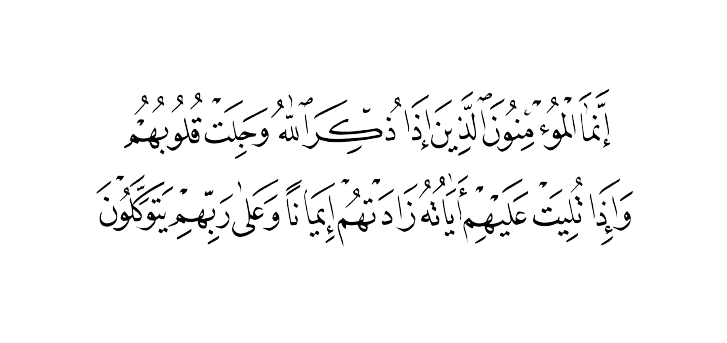Tawakkul: The Hajar Story
This paper seeks to provide tools for strengthening our tawakkul via navigating our knowledge (of Allah), emotional states, and actions.

The Kabah’s establishment starts with the story of a family, not just Prophet Ibrahim (‘alayhi salam, or peace be upon him) alone but also with his wife Hajar (Hagar), their son Ismail, and their immense tawakkul (reliance upon Allah). It starts with Ibrahim bringing Hajar and suckling Ismail near where the Kabah is today. To understand the landscape, Prophet Muhammad (SAW) tells us, “In those days, there was no human being in Makkah, nor was there any water.”1 So, in this destitute land, Ibrahim “placed near them a leather bag containing some dates, and a small water-skin containing some water, and set out homeward.”2
Hajar called out, her voice echoing with confused desperation, “O Ibrahim! Where are you going, leaving us in this valley where there is no person whose company we may enjoy, nor is there anything?”3 Imagine her—a young wife and mother4 with her infant son and her husband seemingly abandoning them without explanation—and the tornado of overwhelming emotions she must have felt: perplexity, frustration, and anger. Also, imagine Ibrahim’s feelings: as a husband and father—whose core function is to protect, provide, and preside over one’s family, or “The Three P’s,” as Imam Farhan Siddiqi calls them—who was not blessed with children until later in life (at least 86 years old),5 commanded to leave his wife and firstborn infant child in the middle of nowhere. He raised his hands in supplication, “Our Lord! I have settled some of my offspring in a barren valley near Your Sacred House, our Lord, so that they may establish prayer. So make the hearts of ˹believing˺ people incline towards them and provide them with fruits, so perhaps they will be thankful.”6 Yet, even with emotions running high, something profound dawned on Hajar. She realized Ibrahim’s behavior was abnormal and asked, “Has Allah commanded you with this?” When he simply replied, “Yes,” she said, “Then He (Allah) will not neglect us,” and returned as Ibrahim continued his journey.7
Ibrahim and Hajar never wavered in their tawakkul, despite being tested in one of the most profoundly human ways—physiological needs, safety and security, and love and belonging are literally the bottom three of Maslow’s hierarchy of needs. Even in the face of such severe tests, their faith and resilience are truly admirable and an essential reminder of our incredibly privileged lives, specifically our increased existential security. In very different ways, they were both stripped of worldly securities and forced to rely upon Allah alone. By eliminating deprivation conditions, minimizing exposure to violence, and achieving self-reliance and confidence in navigating life’s challenges, we have a sense of existential security that lulls us into secular empiricism. Our tawakkul has been undermined,8 with the slightest uncertainty causing emotional angst and anxiety. This paper seeks to provide tools for strengthening our tawakkul.

Knowledge
Hajar’s question—“Has Allah commanded you with this?”—and ability to preserve righteous actions is a testament to her faith in Allah. Imam Al-Ghazali (d. 505/1111) said, “Tawakkul is a subcategory of Iman (faith), and all the categories of Iman are comprised of knowledge, an emotional state, and actions. Similarly, for tawakkul, knowledge is the foundation, actions are its fruit, and the emotional state is what is intended by tawakkul.”9 Life’s challenges are unavoidable, but our faith in Allah is where we can find the fortitude to persevere.
The strength of any relationship is based on our ability to trust the other’s qualities. For example, I have absolute confidence in turning to Sh. Yasir Fahmy for mentorship because of his knowledge, wisdom, and character. With our relationship with Allah, exalted above all examples, we must remember who He is. “He is Allah: the Creator, the Inventor, the Shaper. He ˹alone˺ has the Most Beautiful Names. Whatever is in the heavens and the earth ˹constantly˺ glorifies Him. And He is the Almighty, All-Wise.”10 He is “the One Who has provided you with ˹the good˺ things you know: He provided you with cattle, and children, and gardens, and springs.”11 Everything we missed in the past, currently in our possession, wish to acquire in the future, and within the realm of possibility (if Allah decreed it) is in His control. As the Prophet Muhammad ﷺ said, “Remember: if all the people gather to benefit you, they will not be able to benefit you except that which Allah had foreordained (for you); and if all of them gather to do harm to you, they will not be able to afflict you with anything other than that which Allah had pre-destined against you.”12
We learn about who Allah is from what He, and His Beloved ﷺ, told us about Himself, but our beliefs and thoughts constantly fluctuate—increase and decrease in trust and tranquility. Certainty is only a possible achievement via abundant experiences.13 Pulling from the tapestry of our own experiences (those times when we had completely lost hope, and when we absolutely did not deserve Allah’s aid, He still favored us), there are so many awesomely miraculous moments we can use them as figurative bookmarks in the stories of our lives. Each time we face adversity, we flip through the dogeared pages of past experiences and focus on the highlighted parts that reaffirm our Iman (faith) Allah.

Emotional States
Western society has grown increasingly secular—prioritizing this material earthly life by ignoring (and at times rejecting, especially in a religious context) the otherworldly—since the Enlightenment, culminating in Friedrich Nietzsche (d. 1900) at the turn of the century, famously pronounced, “God is dead … and we have killed him.”14 In addition to our existential security, as mentioned in the introduction, our belief and trust in the ghayb (unseen, metaphysical, reality), and therefore God, has been undermined. Thereby, the responsibility for cause and effect falls entirely on us. Similarly, as Nietzsche questioned, albeit anthropomorphically,15 “How shall we comfort ourselves, the murderers of all murderers? What was the holiest and mightiest of all that the world has yet owned has bled to death under our knives: who will wipe this blood off us?”16
We all have emotions, as they are a part of the human condition. In fact, our emotions are a sign of a living heart. Allah said about the Prophet Muhammad ﷺ, “Now, perhaps you ˹O Prophet˺ will grieve yourself to death over their denial if they ˹continue to˺ disbelieve in this message.”17 Imagine if the Prophet ﷺ did not care about people or their spiritual and existential state with Allah. That would be problematic, as it contradicts the responsibility as a prophet ﷺ. So, Islam does not teach us to rid ourselves of our emotions; on the contrary, it teaches us to question what responses they elicit and to be intentional about our decisions and actions.
Before we take any action, we must recognize our emotional state. Although Imam Al-Ghazali divides the chapter on tawakkul into three categories (knowledge, emotional states, and actions), and later breaks down its conditions, he combines both emotional states and actions. I find this incredibly interesting because I believe managing our emotional states is also an action, particularly for tawakkul. Hajar responded to her predicament (i.e., Allah commanded Ibrahim, her newlywed husband, to leave her and her infant in a barren desert) with, “[Allah] will not neglect us.” That was not an erasure, nor a bypass, of her feelings but an act of tawakkul. She sat with her emotions and then responded wisely. The definition of hikmah (wisdom), in an Islamic context, is “putting things in their proper place.”18 Hajar sat with, negotiated, and processed her emotions (a) through a theocentric lens—placing her knowledge of Allah while having Husn Al-Dhun (good thoughts) about Him19—and (b) to ensure a wise response. This is no easy task and may require tremendous self-control, but it is in wrestling with our emotional states (the bitter and the sweet) that we refine our tawakkul and find the fuel for righteous actions.
Actions
Doing what is right is hard living in our Age of Feeling,20 where “all moral judgments are nothing but expressions of preference, expressions of attitude, insofar as they are moral or evaluative in character.”21 Nevertheless, Islam obligates us to try. Our moral code is determined by the Shariah (Islamic jurisprudence) and not simply what we think is good. As IbnMasud (d. 32/653) rhetorically asked, “How many people intend good and never achieve it?”22 For our actions to be correct, we must strive to ensure our intentions and methods are also correct.
Actions of the Heart (i.e., Intentions)
The Prophet (SAW) said, “The reward of deeds depends upon the intentions, and every person will get the reward according to what he has intended.”23 The intention must be righteous and cannot solely be in pursuit of emotional fulfillment. Allah said in the Quran,
Have you seen ˹O Prophet˺ those who have taken their own desires as their god? ˹And so˺ Allah left them to stray knowingly, sealed their hearing and hearts, and placed a cover on their sight. Who then can guide them after Allah? Will you ˹all˺ not then be mindful?24
We should always seek to alleviate hardship—the Prophet ﷺ never chose the harder of two things25 and said, “[Allah’s] benevolence is easier for [him]”26—but our desires (physical or emotional) should never become the motivating factor of our decision-making. Our responsibility is to ensure that nothing supersedes our morals or values and to ensure that, before acting, we sit with our emotions long enough to discern the best course of action.
Actions of the Limbs
The best course of action is objectively based on the Shariah, but its implementation is relative to our circumstances. Furthermore, because our circumstances are constantly fluctuating and viewed from many perspectives, all we can do is try our best to earn Allah’s pleasure. Hajar’s circumstances seemed insurmountable, emotionally and physically. Still, she exhausted her means—she ran between two hills (Safa and Marwa), chasing a mirage in search of water, and when they were blessed with water, she built up mounds of dirt to contain it. Trying our best (i.e., striving to have Ihsan, or spiritual excellence) does not mean giving up or cowering away. It is a spiritually ethical disposition, internally and externally, the epitome of our tawakkul.
Hajar and Ibrahim did not know what the future held for them, but they worked with Allah’s provisions and exhausted themselves faithfully. Often, our lives are very similar, but we ultimately leave our expectations to Allah. Allah blessed Hajar with Zamzam (the most significant honor being the Prophet ﷺ drinking from it)27 and Ibrahim established the foundations of the Kabah; both are a Sadaqa Jariya (continuous charity), Zamzam still springs forth today and the Kabah is “Surely the first House ˹of worship˺ established for humanity is the one at Bakkah—a blessed sanctuary and a guide for ˹all˺ people.”28 Only Allah knows how heavy our sincerity and efforts will be on our scales (on the Day of Judgement) and how they may benefit people for centuries.

Conclusion
Allah told us the story of Hajar and Ibrahim as an example for us and to put our hearts at peace. We face difficulties entirely beyond our control and without a solution on the horizon. Although these times are emotionally taxing, we do have control over what we do. We must have tawakkul by sitting with our emotions and ensuring we do not react without (1) remembering Allah’s and His magnificent attributes (He put us here and will get us out), (2) ensure our intentions are correct and try our best to act righteously, (3) leave our expectations of the outcome with Him. Allah says about people who do this (i.e., are faithful and mindful of Him), “For them is good news in this worldly life and the Hereafter. There is no change in the promise of Allah. That is ˹truly˺ the ultimate triumph.” They are the servants of Allah who have no fear or grief.
On this sacred day of Arafah, we ask Allah to make us people of sincere tawakkul with goodness, ease, and well-being in our affairs. Ultimately, with Him is all success! Ameen!
Here are some other papers that touch on emotions and spirituality:
Palestine + A Quranic Process for Managing Emotions
This article aims to take from the Quranic narrative of how Allah instructed the Prophet ﷺ to process his emotions with the hopes of providing guidance for our own lives.Spiritual Holding Patterns
Expounding on a pleasantly nostalgic memory of a fishing trip I went on with one of my teachers, this article explores the plateauing phases of life that I call “spiritual holding patterns.”Presence: A Quranic Framework to Finding Spiritual Harmony
"Being present (muhadara) is the presence of a heart with the Lord from behind a veil of sequential proofs, discursive thought, or the overwhelming power of invocation [dhikr]." – Ahmed b. AjibaGratitude: Thanksgiving + Palestinians
Contemplating the story of Moses and the Israelites during the post-Egypt era to find genuine gratitude during seasons of simultaneous consumerism and international turmoil.
Ibid.
Ibid.
“Wife Core Competencies,” the female companion article to Husband Core Competencies, is forthcoming, InshaAllah (God-willing).
Genesis 16:16.
Quran 14:37.
Wildman, Wesley J. “Chapter Four: Religious Naturalism: Contradiction in Terms or Future Spiritual Juggernaut” in A 21st Century Debate on Science and Religion. Edited by Fraser Watts, Harris Wiseman, and Shiva Khaili. Newcastle upon Tyne, United Kingdom: Cambridge Scholars Publishing, 2017. 64.
Al-Ghazali, AbuHamid. Ihya Uloom Al-Din. Jeddah, KSA: Dar Al-Minhaj, 2013. Vol. 8, 201.
Quran 59:24.
Quran 26:132-134.
Al-Ghazali, Ihya, Vol 8, 249.
Nietzsche, Friedrich. The Gay Science. Translated by Walter Kaufmann. New York: Vintage Books, 1974. 181.
There is a consensus in all the schools of Ahlus-Sunnah prohibiting anthropomorphism or ascribing human characteristics or behavior to God. Imam Al-Laqqani (d. 1041/1631) mentions in his famous Jowhar Al-Towheed (The Pearl of Oneness), “Above an opposite, a resemblance, or a partner absolutely or a father, otherwise like a son and friends.” When explaining this, Imam Al-Bajuri (d. 1276/1860) said, “He is not a body [jism]. A body is something compounded and has boundaries, a mark of being contingent.” See Khalfe, Allie. An Outpouring of Subtleties upon the Pearl of Oneness. Rotterdam, the Netherlands: Sunni Publications, 2019. Vol. 1, 220; Britannica, T. Editors of Encyclopaedia. “tashbīh.” Encyclopedia Britannica, July 20, 1998. https://www.britannica.com/topic/tashbih.
Nietzsche, The Gay Science, 181.
Quran 18:6.
Qalaji, Muhammad Rawas. Mujam Lugha Al-Fuqaha. Beirut, Lebanon: Dar Al-Nafais, 1996. 163.
Some of the Salaf (pious predecessors) explained tawakkul as having Husn Al-Dhun with Allah. Ibnul-Qayyum said, “In reality, having Husn Al-Dhun of Allah leads one to have tawakkul. It is unimaginable for one with bad thoughts about Him to have tawakkul, as there is no tawakkul for someone who does not have hope in Him. Allah knows best.” See Ibnul-Qayyim Al-Jowzi, Muhammad b. AbuBakr. Madarij Al-Salikin. Cairo, Egypt: Ibdaa, 2012. 519.
“Abrahamic Faith in the “Age of Feeling” – Professor Robert George and Shaykh Hamza Yusuf.” Hamza Yusuf. February 19, 2017. Video,
This is Alasdair MacIntyre’s definition of “emotivism.” See MacIntyre, Alasdair. After Virtue: A Study in Moral Theory, Second Edition. London, UK: Duckworth, 1985. 11–12; emphasis original.
Al-Darimi, Abdullah b. Abdul-Rahman. Musnad Imam Al-Darimi. 2015. Vol. 1, 120. https://shamela.ws/book/36114/120.
Quran 45:23.
Al-Tabari, Muhammad b. Jarir. Tarikh Al-Tabari. Cairo, Egypt: Dar Al-Ma’arif BiMasr. Vol. 2, 345.
Quran 3:96.



Beautifully written, I can truly relate to her story. Thank you for this reminder ma sha Allah.